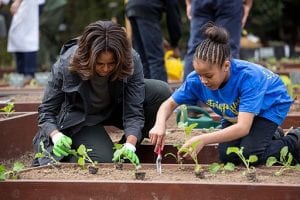
Michelle Obama plants seedlings in the White House Kitchen Garden, Washington, D.C. 2014. Public domain
According to the Sierra Club, of the 31 million tons of food waste tossed each year in the United States, only 3 percent is actually recycled, so I was particularly happy when I read the report on Ecorazzi.org that the vegetable garden being grown on the south lawn of the White House will benefit from composted soil next season, rather than having it shipped in this year.
The waste compost bins will hopefully be used to underline the increasing importance of sourcing one’s food, learning about slow foods, and, of course, putting to use some of that unused space in your yard or neighborhood.
But what’s particularly encouraging about this is that endeavors like these make the concept of community gardening less foreign, more engaging, and, most important, more mainstream, as we’ve discussed here on Rooflines.
As reported in Shelterforce, it’s not just about elevating the use of the garden, but sourcing food is also increasingly becoming essential to a healthy diet. For people living in America’s food deserts — an area with little access to foods needed for a healthy diet and where fast food is often the norm — there is generally a high incidence of diet-linked health problems such as diabetes, heart disease, and obesity.
This is not news to a lot of people, of course, but that doesn’t diminish the impact of seeing the first family engage in a little bit of community gardening.
So there’s really nothing new to report here, but we continue to applaud the White House for promoting this effort. That said, the food waste coming from the gourmet fare at the White House must make for some high quality compost.




Comments